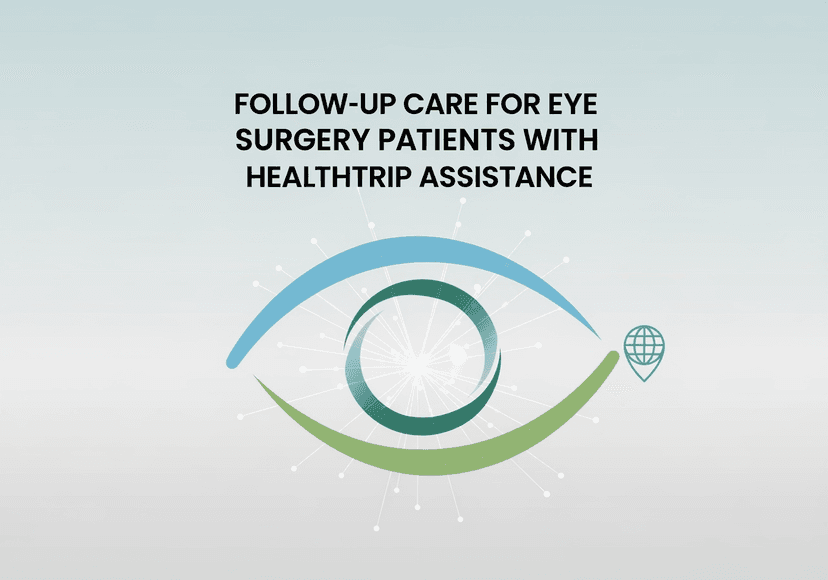
Is It Safe to Travel After Surgery? Tips from Doctors – 2025 Insights
09 Jul, 2025
 Healthtrip
Healthtrip- When is it Generally Safe to Travel After Surgery?
- Specific Surgery Types and Travel Guidelines (2025):
- Why Consulting Your Doctor is Crucial: 2025 Checklist:
- Essential Travel Tips for Post-Surgery Patients (2025 Edition):
- Case Studies and Doctor Recommendations: < li>Potential Risks and Complications of Traveling Too Soon:
- Conclusion: Prioritizing Your Health While Traveling
Understanding Post-Surgery Risks
Post-operative travel presents several potential risks that you need to be aware of. Deep vein thrombosis (DVT), or blood clots, is a significant concern after surgery, especially on long flights. Surgical procedures often increase the risk of blood clot formation due to reduced mobility and changes in blood composition. Longer travel times exacerbate this risk. Wound care presents another challenge, as changes in air pressure and humidity during flights can affect healing. Infections are always a threat, particularly in unfamiliar environments with varying hygiene standards. Swelling, pain, and limited access to medical care while traveling can also complicate recovery. It's essential to have realistic expectations when traveling after surgery. Pushing yourself too hard can hinder healing and lead to setbacks. Consider consulting with doctors at hospitals like NMC Specialty Hospital, Al Nahda, Dubai, to evaluate your specific risks and readiness for travel.
Most popular procedures in India
Doctor's Recommendations: Before You Fly
Before embarking on any post-surgery travel, consulting with your surgeon or a healthcare provider is paramount. They can evaluate your specific condition, the type of surgery you had, and any potential complications. Surgeons at hospitals like Yanhee International Hospital can provide tailored advice based on your medical history and current health status. Your doctor will consider factors such as wound healing, pain management, and the risk of infection. They may recommend postponing travel or taking specific precautions, such as wearing compression stockings to prevent DVT, ensuring adequate hydration, and moving around frequently during flights. It is also important to discuss your itinerary and destination with your doctor so they can consider any potential health hazards at your destination. Ensure you have a written summary of your medical history, current medications, and emergency contacts. This information will be valuable if you need medical attention away from home. Healthtrip can assist in coordinating these consultations and ensuring you have all the necessary documentation for a safe journey.
Wellness Treatments
Give yourself the time to relax
Lowest Prices Guaranteed!

Lowest Prices Guaranteed!
Essential Tips for Safe Travel Post-Surgery
To ensure a safe and comfortable journey after surgery, several practical tips can be followed. Firstly, plan your trip meticulously. Break up long journeys into shorter segments to allow for rest and movement. Choose accommodations with easy access and comfortable amenities, such as elevators and supportive beds. Secondly, manage your medications effectively. Ensure you have an adequate supply of all prescribed medications, along with copies of your prescriptions. Keep medications in their original containers and carry them in your hand luggage. Thirdly, prioritize wound care. Follow all instructions provided by your surgeon regarding wound cleaning and dressing changes. Pack a travel-sized first aid kit with essential supplies, such as antiseptic wipes, bandages, and pain relievers. Fourthly, address mobility concerns early on. Request assistance at airports if needed, and consider using a wheelchair or mobility aid to reduce strain. Stay hydrated by drinking plenty of water and avoid excessive alcohol consumption. Finally, plan for emergencies and seek medical advice from facilities near you such as Taoufik Clinic. Healthtrip can assist by providing a list of verified healthcare providers at your destination, ensuring swift medical help if needed.
Choosing the Right Time to Travel
Determining the right time to travel after surgery depends on several factors, with the type of surgery being a primary consideration. Minor procedures like laparoscopic surgeries generally allow for quicker travel compared to major surgeries such as joint replacements or open-heart procedures. The stage of your recovery also plays a significant role; traveling too soon after surgery can increase the risk of complications, while waiting until you've regained some strength and mobility can make the journey more manageable. Consider the destination when making your decision. Destinations with limited access to quality medical care or those requiring strenuous activities should be approached with caution. For example, traveling to remote areas shortly after surgery might not be the best idea. Listen to your body and trust your instincts, take guidance from hospitals like Fortis Escorts Heart Institute. If you're experiencing persistent pain, swelling, or fatigue, it's crucial to postpone your trip until you're feeling better. Healthtrip can assist you in evaluating these factors and making an informed decision about the optimal time to travel, ensuring the best possible outcome for your recovery.
Travel Insurance and Medical Assistance
When planning post-surgery travel, securing comprehensive insurance coverage is of paramount importance. Standard travel insurance policies may not adequately cover pre-existing medical conditions or complications arising from recent surgery. Therefore, it’s essential to seek out insurance plans specifically designed for travelers with medical needs. These policies should cover emergency medical expenses, including hospitalization, surgery, and repatriation if necessary. Make sure the insurance provides coverage for the specific type of surgery you underwent and any potential complications that may arise. It’s also crucial to understand the policy’s exclusions and limitations, such as restrictions on certain activities or destinations. Ensure you have access to medical assistance services while traveling. Many insurance providers offer 24/7 helplines that can connect you with doctors, hospitals, or other healthcare professionals in your destination. Consider contacting hospitals like Quironsalud Hospital Murcia for assistance. Consider Healthtrip’s additional support for medical assistance, providing peace of mind during your travels.
When is it Generally Safe to Travel After Surgery?
Embarking on a journey after surgery requires careful consideration and isn't a one-size-fits-all scenario. Think of it as navigating a winding road – you need to proceed with caution and understand the terrain. Generally speaking, the timeline for safe travel post-surgery hinges on several factors: the type of surgery you underwent, your overall health, any complications that arose during or after the procedure, and the distance and mode of travel you're planning. Minor procedures, like a routine outpatient surgery, might only necessitate a few days of rest before you're cleared for travel. However, more invasive surgeries, such as major abdominal or orthopedic procedures, could require weeks or even months of recovery before travel becomes a viable option. It’s not just about the physical healing; consider the potential for swelling, pain, and the need for follow-up appointments. The goal is to ensure you're stable and comfortable enough to handle the rigors of travel without jeopardizing your recovery. Remember, rushing back into your routine, including travel, can potentially increase the risk of complications. So, take your time, listen to your body, and prioritize your health above all else. Healthtrip understands the complexities of post-operative care and can help you connect with medical professionals who can offer personalized advice.
Factors Influencing Post-Surgery Travel
Several interlocking factors influence when it is generally safe to travel after surgery. First and foremost, the nature of the surgery plays a pivotal role. A minimally invasive procedure usually entails a shorter recovery period than a major operation. For instance, someone who has undergone arthroscopic surgery might be ready to travel within a couple of weeks, while a patient recovering from open-heart surgery might need several months. Underlying health conditions such as diabetes, heart disease, or a compromised immune system can significantly prolong the recovery process and, consequently, the waiting period before travel. The development of any post-operative complications, like infections, blood clots, or wound healing issues, will undoubtedly push back your travel plans. Furthermore, the type of travel you intend to undertake also matters. A short car journey is different from a long-haul flight, with the latter potentially posing a greater risk of blood clots and other complications due to prolonged immobility and changes in cabin pressure. At Healthtrip, we prioritize your safety and wellbeing, and our resources can aid you in assessing these factors with your doctor to make well-informed decisions about your upcoming travel ventures. Considering hospitals like Fortis Shalimar Bagh or Max Healthcare Saket, renowned for their post-operative care, can provide extended support before you plan your trip.
Specific Surgery Types and Travel Guidelines (2025):
Navigating the post-operative period involves understanding the specific guidelines for different surgical procedures. In 2025, medical advancements have refined these guidelines, offering increasingly personalized recommendations. Let's consider a few common examples. For patients who've undergone orthopedic surgeries like hip or knee replacements, travel is generally discouraged for at least 4 to 6 weeks due to the risk of blood clots and the need for physiotherapy. Long flights can exacerbate swelling and stiffness. For those who've had abdominal surgeries, such as a gallbladder removal or a hysterectomy, a recovery period of 2 to 4 weeks is often recommended before flying, accounting for potential wound healing complications. Cardiac surgeries, like bypass or valve replacements, typically require a longer waiting period, often 6 to 8 weeks, to ensure heart stability and reduce the risk of arrhythmias during travel. Cosmetic surgeries, such as facelifts or breast augmentations, usually necessitate 1 to 2 weeks before flying to allow for initial healing and swelling to subside. However, it's vital to acknowledge that these are just general timelines. Each case is unique, and individual factors such as age, overall health, and the presence of complications can significantly influence these recommendations. Healthtrip emphasizes the importance of consulting with your surgical team at hospitals such as Memorial Sisli Hospital or Vejthani Hospital to get specific, personalized advice tailored to your particular surgery and medical history.
2025's Updated Guidelines
The updated guidelines for post-operative travel in 2025 reflect a growing emphasis on personalized medicine and minimally invasive techniques. For instance, with the rise of robotic surgery and laparoscopic procedures, recovery times have often been significantly reduced. Patients undergoing these minimally invasive surgeries may be cleared for travel sooner than those who had traditional open surgeries. Advancements in blood clot prevention have also played a significant role. New anticoagulation medications and compression devices now allow for safer travel, especially on long-haul flights, for certain patient populations. Additionally, telehealth and remote monitoring technologies have enabled doctors to track patients' recovery progress from afar, making it easier to provide timely advice on when it's safe to travel. These updated guidelines also acknowledge the psychological impact of prolonged recovery and isolation. For many patients, the ability to travel and resume their normal lives is a significant factor in their overall wellbeing. Therefore, healthcare professionals are increasingly considering the emotional aspects of recovery when making travel recommendations. Healthtrip keeps abreast of these evolving guidelines, ensuring that our users have access to the most current and accurate information. Reputable facilities like NMC Specialty Hospital, Al Nahda, Dubai, offer comprehensive post-operative guidance incorporating these updated protocols. Remember to factor in facilities like Saudi German Hospital Cairo, Egypt for convenient travel options in the region.
Why Consulting Your Doctor is Crucial: 2025 Checklist:
Consulting your doctor before traveling after surgery isn't just a suggestion; it's a cornerstone of responsible post-operative care. Think of your doctor as your personal travel guide, expertly equipped to assess your unique situation and provide tailored recommendations. Your doctor possesses invaluable knowledge about your medical history, the specifics of your surgery, and any potential complications you may have experienced. They can evaluate your current health status, assess your risk factors, and advise you on when it's safe to resume travel. Moreover, your doctor can offer specific instructions on managing your medications, wound care, and potential symptoms while you're on the road. They can also provide you with a letter outlining your medical condition and treatment plan, which can be incredibly useful in case of emergency during your travels. In essence, consulting your doctor is about taking a proactive approach to safeguard your health and wellbeing. It's about mitigating risks, preventing complications, and ensuring that you can enjoy your travel experiences without jeopardizing your recovery. Healthtrip strongly encourages all patients to seek medical clearance before embarking on any post-operative travel. Hospitals such as Singapore General Hospital and Bangkok Hospital prioritize thorough patient consultations before clearing them for travel.
2025 Consultation Checklist
To make the most of your pre-travel consultation in 2025, come prepared with a detailed checklist of questions and concerns. Firstly, discuss your travel plans in detail, including your destination, mode of transport, duration of the trip, and planned activities. This allows your doctor to assess the potential risks associated with your specific itinerary. Secondly, inquire about any necessary vaccinations or medications you may need for your destination, keeping in mind that certain vaccines may be contraindicated shortly after surgery. Thirdly, ask about strategies for managing pain, swelling, or other symptoms while traveling, including over-the-counter remedies and prescription medications. If you are planning to travel to a different country, proactively ask your doctor for recommendations for hospitals and/or clinics in that area. Fourthly, clarify any restrictions on your diet, activity level, or mobility, and how to adapt these restrictions while traveling. Fifthly, obtain a written summary of your medical history, medications, and emergency contact information to carry with you. Lastly, discuss potential warning signs or symptoms that should prompt you to seek immediate medical attention while away from home. By following this comprehensive checklist, you can ensure that you're well-prepared for your post-operative travels and minimize the risk of complications. Healthtrip can connect you with leading medical professionals at renowned hospitals like Quironsalud Hospital Murcia or Hisar Intercontinental Hospital who can provide expert guidance and support. Furthermore, taking advantage of services like those at London Medical can help ensure you have the support you need.
Also Read:
Essential Travel Tips for Post-Surgery Patients (2025 Edition):
Embarking on a journey after surgery requires meticulous planning and a proactive approach to ensure your health and well-being remain a top priority. The key is to anticipate potential challenges and equip yourself with the necessary tools and knowledge to navigate them effectively. Start by creating a detailed checklist encompassing all essential items, medications, and documents you might need. Pack light but strategically, prioritizing comfort and accessibility. Consider investing in travel-sized versions of your regular hygiene products to save space and adhere to airline regulations. Furthermore, research the medical facilities available at your destination. Knowing the location of hospitals or clinics can provide peace of mind in case of unexpected health concerns. For example, if you are traveling to Bangkok, Thailand, knowing that hospitals like Bangkok Hospital or Vejthani Hospital are easily accessible can be reassuring. Remember, preparation is paramount, and a well-thought-out plan can significantly reduce stress and ensure a smoother, healthier travel experience post-surgery. Don't hesitate to lean on Healthtrip for assistance in coordinating your travel arrangements and accessing reliable healthcare information.
Medication Management
One of the most critical aspects of post-surgery travel is managing your medications effectively. Before you even begin packing, compile a comprehensive list of all medications you are currently taking. This list should include the generic and brand names of the drugs, dosages, frequency, and the prescribing doctor's contact information. Ensure you have an ample supply of each medication to cover the entire duration of your trip, and it's wise to bring a little extra in case of unforeseen delays. Keep all medications in their original labeled containers to avoid any confusion or issues with airport security. Pack your medications in your carry-on luggage, not in your checked baggage, to ensure they are always within reach. If you are traveling to a different country, research the local regulations regarding medication importation. Some countries may require a letter from your doctor authorizing your medication. For example, if you’re heading to Turkey and need post-surgical care, facilities such as LIV Hospital, Istanbul or Hisar Intercontinental Hospital may require documentation for specific medications. Additionally, consider setting alarms or reminders on your phone to ensure you take your medications at the correct times, regardless of time zone changes. Taking these precautions can help prevent medication-related complications and ensure your recovery remains on track.
Comfortable Attire and Accessories
The journey to recovery is significantly enhanced when comfort is given utmost importance, especially when you're on the move. Choosing the right attire and accessories can make all the difference in your post-operative travel experience. Opt for loose-fitting, breathable clothing made from natural fabrics like cotton or linen to avoid any unnecessary pressure or irritation on your surgical site. Elastic waistbands are your best friend, as they offer flexibility and accommodate potential swelling. Layering is also a smart strategy, allowing you to adjust to varying temperatures in different environments. Comfortable shoes are non-negotiable, and slip-on styles are particularly convenient for airport security checks. Consider investing in compression socks to promote healthy circulation and reduce the risk of blood clots, especially on long flights. If you have any incisions or sensitive areas, bring soft bandages or gauze for extra protection. Neck pillows, eye masks, and earplugs can also contribute to a more restful journey, minimizing distractions and promoting relaxation. Remember, feeling comfortable and relaxed can positively impact your overall well-being and facilitate a smoother recovery process. Don't underestimate the power of simple comforts in making your post-surgery travel as pleasant as possible. Healthtrip partners with facilities like Fortis Escorts Heart Institute and Max Healthcare Saket, which emphasizes patient comfort in their post-operative care, ensuring your travel after treatment is as smooth as possible.
Movement and Circulation
Maintaining adequate movement and circulation is paramount to prevent complications like blood clots, especially during long periods of sitting during travel. Make it a priority to get up and move around regularly, ideally every one to two hours. If you are on a flight, take advantage of the aisle to stretch your legs and do some gentle exercises. Simple ankle rotations, calf raises, and shoulder rolls can significantly improve circulation. If you're on a road trip, plan frequent stops to get out of the car, walk around, and stretch. When you're seated, avoid crossing your legs, as this can restrict blood flow. Compression socks are highly recommended, as they provide gentle pressure to the legs, promoting healthy circulation. Stay well-hydrated by drinking plenty of water throughout your journey. Dehydration can thicken the blood, increasing the risk of clots. If you have a history of blood clots or other circulatory issues, consult your doctor about whether you need to take any additional precautions, such as blood-thinning medication. Being proactive about your movement and circulation can significantly reduce the risk of complications and ensure a safer, more comfortable post-surgery travel experience. Hospitals like Mount Elizabeth Hospital in Singapore often provide guidelines on post-operative movement to ensure patients travel safely.
Hygiene and Wound Care
Maintaining proper hygiene and diligently caring for your wound is crucial to prevent infections and promote optimal healing while traveling post-surgery. Before you depart, ensure you have all the necessary supplies for wound care, including sterile dressings, antiseptic wipes, and any prescribed ointments or creams. Pack these items in a separate, easily accessible bag for convenience. Wash your hands thoroughly with soap and water before and after touching your wound. Follow your doctor's instructions on how to clean and dress your wound properly. Avoid using public restrooms if possible, and always carry hand sanitizer for situations where soap and water are not available. If you are traveling to a region with questionable water quality, use bottled water for cleaning your wound. Keep the wound site dry and protected from dirt, sweat, and other potential contaminants. Change your dressings regularly, as directed by your doctor. Watch for any signs of infection, such as increased pain, redness, swelling, or discharge, and seek immediate medical attention if you notice any of these symptoms. Remember, meticulous hygiene practices and careful wound care are essential for a smooth and complication-free recovery. Hospitals like Saudi German Hospital Cairo, Egypt, and Quironsalud Hospital Murcia provide detailed wound care instructions to patients before they travel, ensuring a seamless recovery process.
Diet and Hydration
Maintaining a balanced diet and staying adequately hydrated are fundamental to supporting your body's healing process and overall well-being while traveling after surgery. Pack healthy snacks like fruits, nuts, and protein bars to avoid unhealthy fast-food options during transit. Opt for easily digestible foods that won't strain your digestive system. Avoid foods that are high in sugar, salt, or processed ingredients, as they can hinder your recovery. Drink plenty of water to stay hydrated, especially during long flights or hot weather. Dehydration can lead to fatigue, constipation, and other complications. Avoid sugary drinks and excessive caffeine, as they can have a diuretic effect and further dehydrate you. If you have any dietary restrictions or specific nutritional needs, plan your meals and snacks accordingly. Consider bringing a small cooler to keep your food fresh and avoid potential contamination. Pay attention to food safety, especially when traveling to regions with different hygiene standards. Choose reputable restaurants and avoid eating raw or undercooked foods. Remember, nourishing your body with the right nutrients and staying hydrated can significantly enhance your recovery and ensure a more comfortable travel experience. Some facilities like Fortis Memorial Research Institute, Gurgaon, offer dietary consultations to patients post-surgery to ensure their nutritional needs are met during travel.
Rest and Relaxation
Prioritizing rest and relaxation is crucial for allowing your body to heal and recover effectively while traveling post-surgery. Plan your itinerary to include ample downtime and avoid overexertion. Avoid scheduling too many activities or sightseeing tours, and allow yourself plenty of time to rest and recuperate. Listen to your body and take breaks whenever you feel tired or overwhelmed. Create a relaxing environment in your hotel room by dimming the lights, using aromatherapy, or listening to calming music. Practice relaxation techniques like deep breathing, meditation, or yoga to reduce stress and promote relaxation. Get plenty of sleep, as this is when your body does most of its healing. Avoid screen time before bed, as the blue light can interfere with your sleep. If you are traveling with others, communicate your need for rest and ask for their support in creating a peaceful environment. Remember, prioritizing rest and relaxation can significantly enhance your recovery and ensure a more enjoyable travel experience. Facilities like BNH Hospital in Bangkok offer serene recovery environments to promote relaxation during post-operative care, ensuring patients are well-rested before they travel.
Also Read:
Case Studies and Doctor Recommendations:
Understanding real-world experiences can significantly aid in making informed decisions regarding post-surgery travel. Consider the case of a patient who underwent a knee replacement at OCM Orthopädische Chirurgie München in Germany. Following the procedure, the orthopedic surgeon recommended a specific rehabilitation program before allowing the patient to travel back home. This program included gentle exercises, regular check-ups, and detailed guidelines on managing pain and swelling during the journey. The patient was also advised to use compression socks and take frequent breaks to stretch their legs during the flight. Similarly, a patient who had cardiac surgery at Fortis Escorts Heart Institute in New Delhi received personalized recommendations from the cardiac surgeon. These included avoiding heavy lifting, maintaining a low-sodium diet, and monitoring their heart rate and blood pressure regularly. The patient was also advised to carry a copy of their medical records and a list of emergency contacts. These examples highlight the importance of individualized care and the need to follow your doctor's recommendations closely. Consulting with healthcare professionals at renowned institutions like Memorial Sisli Hospital in Istanbul or Cleveland Clinic London can provide valuable insights and guidance tailored to your specific condition and travel plans. Healthtrip can assist in connecting you with experienced doctors and accessing comprehensive medical information to ensure a safe and comfortable journey.
Expert Opinions on Travel Post-Surgery
Gaining insights from medical experts can provide clarity and confidence when planning your post-surgery travel. Surgeons at facilities like Yanhee International Hospital in Bangkok and Singapore General Hospital emphasize the importance of patient education and shared decision-making. They stress the need for patients to understand the potential risks and complications associated with travel and to actively participate in developing a comprehensive travel plan. According to Dr. [Name of Doctor, if available] at NMC Specialty Hospital, Al Nahda, Dubai, patients should be aware of the signs and symptoms of post-operative complications and know how to access medical care at their destination. They also recommend that patients carry a medical alert card or wear a medical ID bracelet identifying their condition and any allergies. Physicians at Jiménez Díaz Foundation University Hospital in Madrid advise patients to consult with a travel medicine specialist before embarking on international travel, especially if they are traveling to regions with endemic diseases. Travel medicine specialists can provide vaccinations, medications, and advice on preventing travel-related illnesses. By seeking expert opinions and following their recommendations, you can significantly reduce the risks associated with post-surgery travel and ensure a smoother, healthier journey. Healthtrip can facilitate consultations with leading medical professionals to help you make informed decisions and plan your travel with confidence.
Documented Patient Experiences
Hearing directly from individuals who have traveled post-surgery can offer valuable perspectives and practical tips. Many patients who have undergone procedures at facilities like Vejthani Hospital in Bangkok and Helios Klinikum Erfurt in Germany have shared their experiences online, providing insights into the challenges they faced and the strategies they used to overcome them. One patient, who had a hip replacement at Quironsalud Hospital Toledo, described how they carefully planned their itinerary, allowing for frequent rest stops and avoiding strenuous activities. They also emphasized the importance of packing light and bringing assistive devices like a cane or walker. Another patient, who had cosmetic surgery at Taoufik Hospitals Group, Tunisia, shared how they communicated their needs to the airline staff and requested assistance with boarding and deplaning. They also highlighted the importance of staying hydrated and avoiding alcohol and caffeine. These documented experiences underscore the importance of preparation, communication, and self-care. By learning from others' experiences, you can anticipate potential challenges and develop effective strategies to navigate them. Healthtrip can connect you with patient support groups and online forums where you can share your experiences and learn from others.
Also Read:
Potential Risks and Complications of Traveling Too Soon:
Traveling too soon after surgery can pose significant risks and potentially lead to various complications that can hinder your recovery and even jeopardize your health. One of the most common risks is the increased chance of infection. Surgical sites are vulnerable to bacteria and other pathogens, and the stress of travel can weaken your immune system, making you more susceptible to infections. Another potential complication is the development of blood clots, particularly in the legs. Prolonged periods of sitting during flights or car rides can restrict blood flow and increase the risk of deep vein thrombosis (DVT). Surgical procedures can also increase the risk of bleeding, and the changes in air pressure during flights can exacerbate this risk. Furthermore, traveling too soon can put undue stress on your surgical site, leading to pain, swelling, and delayed healing. It is crucial to understand these potential risks and to prioritize your health and well-being by allowing sufficient time for recovery before embarking on any travel plans. Consulting with your doctor and following their recommendations is essential to minimize these risks and ensure a safe and successful recovery. Healthtrip advises against rushing travel plans and can provide support in coordinating your journey according to your doctor’s advice.
Infection and Wound Healing
One of the primary concerns with traveling too soon after surgery is the heightened risk of infection and impaired wound healing. Surgical incisions disrupt the body's natural defenses, leaving the area vulnerable to bacterial invasion. The stress associated with travel, including changes in environment, exposure to new pathogens, and disruptions to your regular routine, can further weaken your immune system, making you more susceptible to infections. Symptoms of a wound infection can include increased pain, redness, swelling, warmth, and pus-like drainage. If you experience any of these symptoms while traveling, it is crucial to seek immediate medical attention. Additionally, traveling too soon can disrupt the delicate process of wound healing. Movement and activity can put stress on the surgical site, potentially causing the incision to reopen or delaying the formation of new tissue. To minimize these risks, it is essential to follow your doctor's instructions on wound care and hygiene. Keep the incision clean and dry, change dressings regularly, and avoid activities that could put strain on the area. If you are concerned about the potential for infection or delayed wound healing, consider postponing your travel plans until your doctor has given you the all-clear. Hospitals like London Medical and Real Clinic provide comprehensive post-operative care to ensure wounds heal properly before patients travel.
Blood Clots and Circulatory Issues
Traveling shortly after surgery significantly increases the risk of blood clots, particularly deep vein thrombosis (DVT), a serious condition that can have life-threatening consequences. Surgical procedures often cause inflammation and changes in blood clotting factors, making you more prone to developing clots. Prolonged periods of sitting during flights or car rides further exacerbate this risk by restricting blood flow in the legs and increasing venous stasis. Symptoms of DVT can include pain, swelling, redness, and warmth in the affected leg. If a blood clot breaks loose and travels to the lungs, it can cause a pulmonary embolism (PE), a potentially fatal condition characterized by shortness of breath, chest pain, and coughing up blood. To minimize the risk of blood clots, it is essential to take preventive measures, such as wearing compression socks, staying hydrated, and moving around regularly. Get up and walk around every hour, and do ankle rotations and calf raises while seated. If you have a history of blood clots or other circulatory issues, talk to your doctor about whether you need to take blood-thinning medication before traveling. Facilities like The Royal Marsden Private Care, London, take extensive precautions to prevent blood clots in post-operative patients before they travel.
Dehydration and Fatigue
Dehydration and fatigue are common side effects of surgery and can be exacerbated by the demands of travel, potentially leading to complications and hindering your recovery. Surgical procedures often result in fluid loss, and the stress of travel can further deplete your body's hydration levels. Dehydration can lead to fatigue, dizziness, headache, constipation, and decreased blood pressure. Additionally, fatigue can weaken your immune system and make you more susceptible to infections. Traveling can also disrupt your sleep patterns, further contributing to fatigue and impairing your ability to heal. To prevent dehydration and fatigue, it is essential to drink plenty of fluids throughout your journey. Carry a water bottle with you and sip on it regularly. Avoid sugary drinks and excessive caffeine, as they can have a diuretic effect and worsen dehydration. Prioritize rest and relaxation, and avoid overexertion. Listen to your body and take breaks whenever you feel tired or overwhelmed. If you are experiencing severe dehydration or fatigue, seek medical attention. Facilities like NMC Royal Hospital, DIP, Dubai, emphasize hydration and rest in their post-operative care protocols to ensure patients travel safely after surgery.
Also Read:
Conclusion: Prioritizing Your Health While Traveling
In conclusion, traveling after surgery requires careful consideration and meticulous planning. While the desire to resume your normal activities is understandable, prioritizing your health and recovery is paramount. Before embarking on any travel plans, consult with your doctor to assess your individual risk factors and obtain personalized recommendations. Follow their instructions diligently, and take all necessary precautions to minimize the potential for complications. Be proactive about your health by managing your medications effectively, maintaining proper hygiene, staying hydrated, and prioritizing rest and relaxation. Remember, your well-being is the top priority, and rushing into travel can jeopardize your recovery. With careful planning and a proactive approach, you can navigate post-surgery travel safely and successfully. Healthtrip is committed to supporting you throughout your journey, providing access to reliable medical information, connecting you with experienced healthcare professionals, and assisting with travel arrangements tailored to your specific needs. Traveling after surgery doesn't have to be daunting; with the right preparation and support, you can enjoy a safe and comfortable journey while prioritizing your health.
Related Blogs

Complete Cost Breakdown of Eye Surgery with Healthtrip
Learn about doctors, hospitals, procedures, and recovery for eye surgery

How to Prepare for Your Eye Surgery in India
Learn about doctors, hospitals, procedures, and recovery for eye surgery

Side Effects and Risk Management of Eye Surgery
Learn about doctors, hospitals, procedures, and recovery for eye surgery

Follow-Up Care for Eye Surgery Patients with Healthtrip Assistance
Learn about doctors, hospitals, procedures, and recovery for eye surgery

Best Hospital Infrastructure for Eye Surgery
Learn about doctors, hospitals, procedures, and recovery for eye surgery

What to Expect During a Eye Surgery Consultation
Learn about doctors, hospitals, procedures, and recovery for eye surgery










